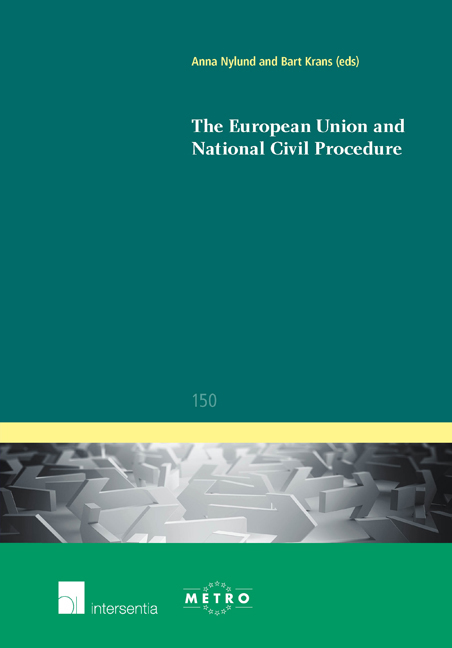Book contents
- Frontmatter
- Contents
- About the Authors
- List of Abbreviations
- The European Union and National Civil Procedure – A Rocky Road or a Smooth Process?
- Some European Challenges for Belgian Civil Procedure
- Danish Civil Procedure and the Internal Market: Impact and Challenges of Sectoral Harmonisation
- European Influences upon English Civil Justice: Tempests or Gentle Breezes?
- European Union and National Civil Procedure: The French Paradox
- The European Union and Civil Procedure from a German Perspective
- Interaction between European Law and Hungarian Civil Procedure Law
- The Impact of EU Law on Dutch Civil Procedure Law
- Norway: An Insider Outside – or an Outsider Inside – European Civil Justice
- Polish Civil Proceedings: How Much Europeanised?
- Slovenian Civil Procedure and the Transformative Power of the EU
- The Curious Incident of the Dog in the Night-Time: Europeanisation of Civil Procedure in Sweden
- Conclusions and Outlook
- Index
- Miscellaneous Endmatter
The Curious Incident of the Dog in the Night-Time: Europeanisation of Civil Procedure in Sweden
Published online by Cambridge University Press: 19 December 2017
- Frontmatter
- Contents
- About the Authors
- List of Abbreviations
- The European Union and National Civil Procedure – A Rocky Road or a Smooth Process?
- Some European Challenges for Belgian Civil Procedure
- Danish Civil Procedure and the Internal Market: Impact and Challenges of Sectoral Harmonisation
- European Influences upon English Civil Justice: Tempests or Gentle Breezes?
- European Union and National Civil Procedure: The French Paradox
- The European Union and Civil Procedure from a German Perspective
- Interaction between European Law and Hungarian Civil Procedure Law
- The Impact of EU Law on Dutch Civil Procedure Law
- Norway: An Insider Outside – or an Outsider Inside – European Civil Justice
- Polish Civil Proceedings: How Much Europeanised?
- Slovenian Civil Procedure and the Transformative Power of the EU
- The Curious Incident of the Dog in the Night-Time: Europeanisation of Civil Procedure in Sweden
- Conclusions and Outlook
- Index
- Miscellaneous Endmatter
Summary
‘Is there any point to which you would wish to draw my attention?’
‘To the curious incident of the dog in the night-time.’
‘The dog did nothing in the night-time.’
‘That was the curious incident,’ remarked Sherlock Holmes.
Introduction
In the political discussion preceding Sweden's entry into the EU, and earlier that into the EEA, procedural law was largely left aside. No procedural consequences of EU membership appears to have been foreseen by the legislator. With the exception of a brief statement to the effect that Union law should be enforced in accordance with national procedural law, possible implications for domestic procedural rules were not even commented upon in the travaux préparatoires.
As it is now firmly established that where substantive EU law rights are concerned, the so-called procedural autonomy of the Member States does not exclude EU law impact even on core issues of civil procedure in purely domestic disputes, it would be gratifying to be able to say that during the 20 years that Sweden has been a member of the Union, there has been an increased awareness of the procedural implications of EU law. Unfortunately, however, this does not appear to be the case. Instead, the depiction of the Europeanisation of civil procedure in Sweden is a story of a process halted before it started: of what might have happened, but did not; of what ought to have been done, but was omitted.
The Swedish approach to implementation of EU law in the field of procedures and remedies is mostly a restrictive one. Clear obligations are complied with, but there is little evidence of loyalty going beyond the minimum requirements. European legal acts are typically implemented, but not considered as possible models for national reform beyond their immediate scope of application. Spillovers are rare; as are legislative and judicial attempts at proactivity or avoidance of fragmentation. The case law of the Court of Justice for the European Union (ECJ) is oft en overlooked or interpreted narrowly, and courts only occasionally consider the need for harmonious interpretation or setting aside of national procedural rules.
- Type
- Chapter
- Information
- The European Union and National Civil Procedure , pp. 147 - 160Publisher: IntersentiaPrint publication year: 2016
- 1
- Cited by



